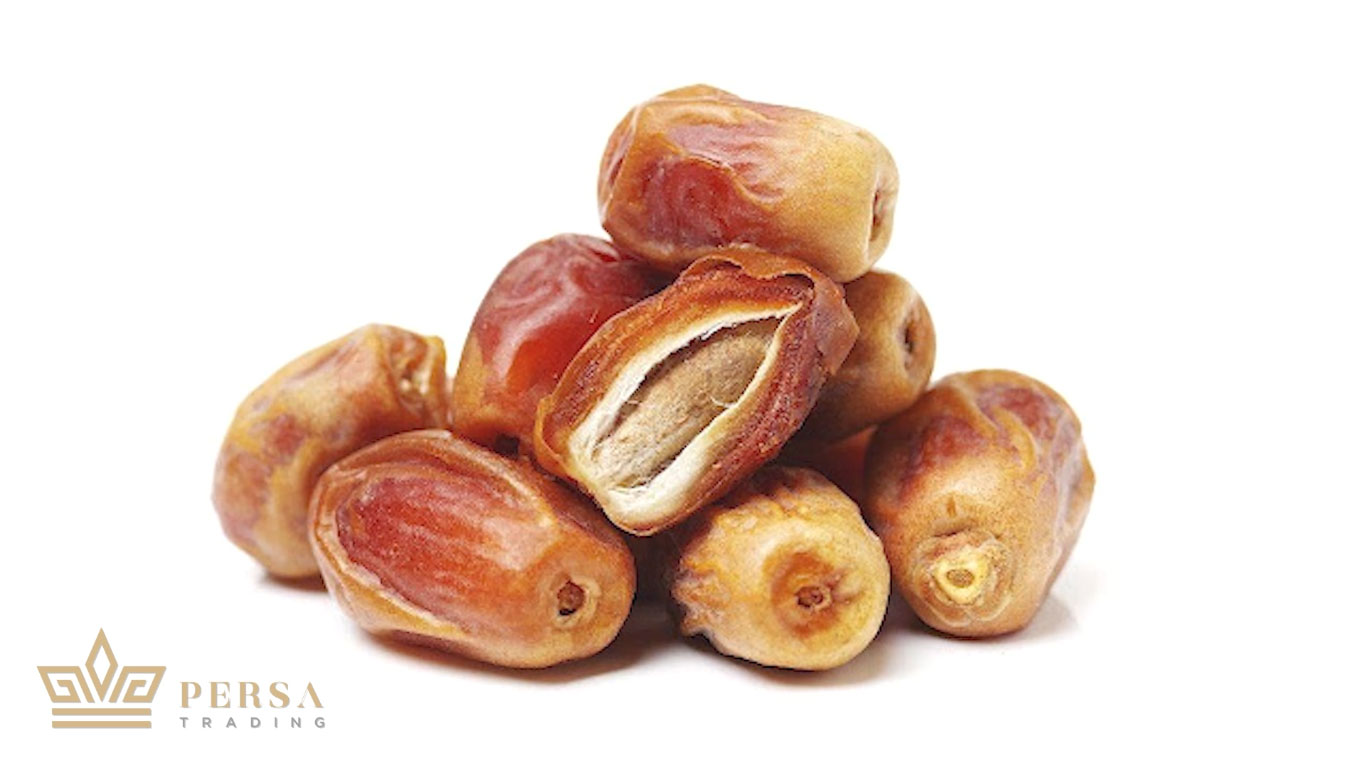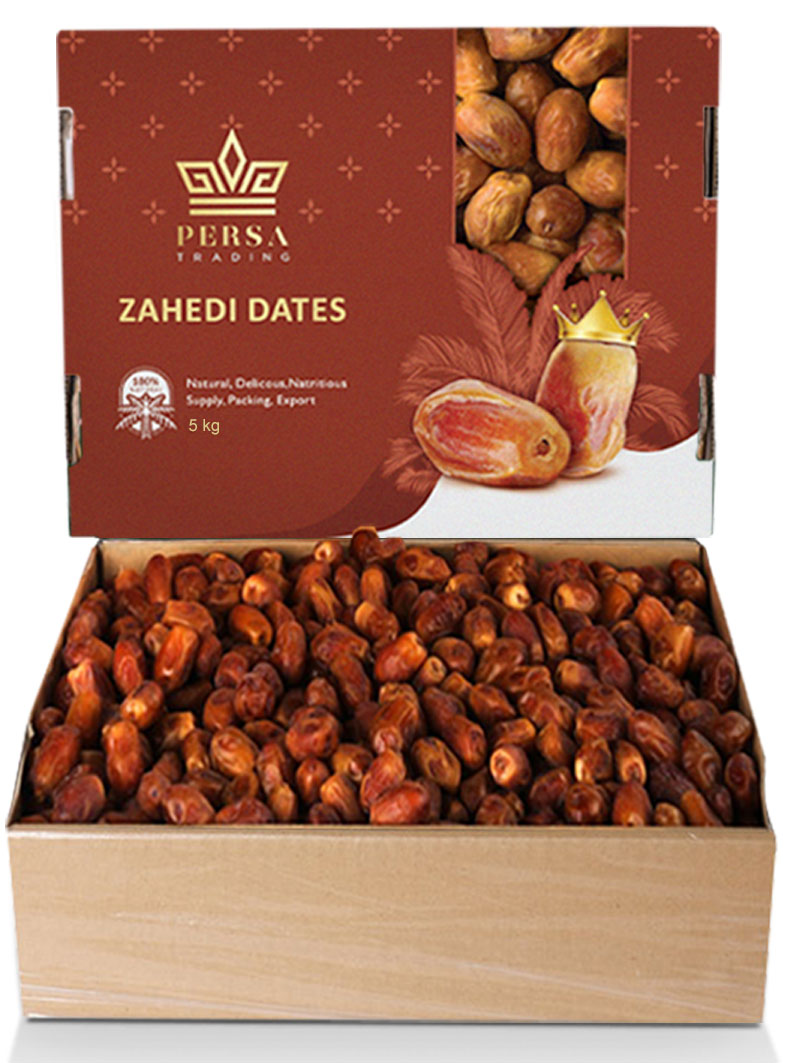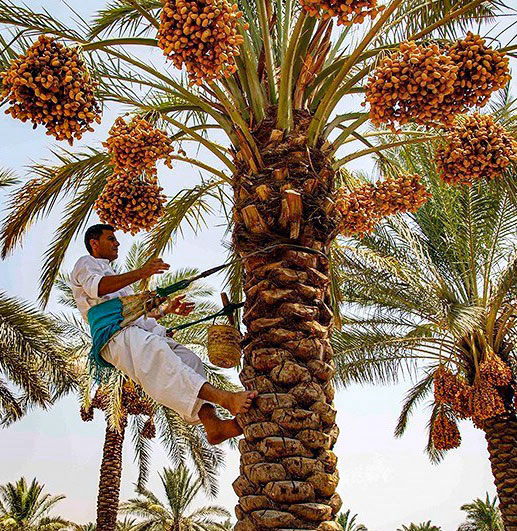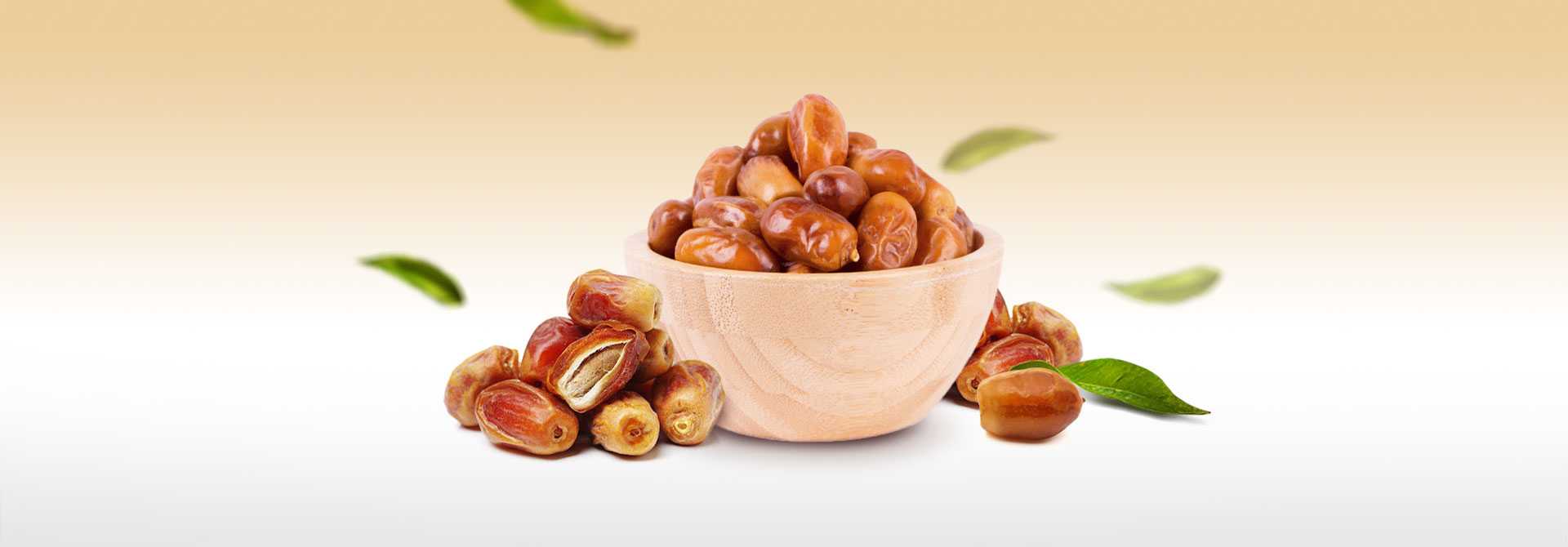Buy Bulk Zahedi Dates from Iran at the Best Wholesale Price
Zahedi dates, also known as “Golden Dates,” are one of Iran’s most popular and widely recognized varieties. With their brilliant golden color, shiny and beautiful skin, delicious flavor, gentle sweetness, and a hint of tartness, they are cherished by date lovers all over the world.
Thanks to their naturally dry texture, Zahedi dates are easy to store, transport, and export, making them a highly sought-after choice in international markets. Packed with essential nutrients and offering a naturally delightful taste, these dates are a perfect option for health-conscious consumers and businesses alike.
If you are looking for a reliable Zahedi dates supplier or want to check the latest Zahedi dates wholesale price, we provide top-quality dates at competitive rates. Click the button below to buy wholesale Zahedi dates directly from Iran.

Would you like to get more familiar with the varieties of dates we can supply?

Step-by-Step Guide to Buying Bulk Zahedi Dates from a Reliable Zahedi Dates Supplier at the Best Price
In this exclusive video, your host Komeil walks you through every step of sourcing top-quality Zahedi dates — the famous golden variety from Iran. Learn how to identify authentic Zahedi dates, compare wholesale prices, calculate shipping and logistics expenses, assess supplier credibility, and steer clear of the most common pitfalls in the global date market.
Whether you’re a seasoned importer or entering the trade for the first time, this guide equips you with practical tips and insider knowledge to streamline your purchasing process and maximize your profits. Watch now and take your first step toward importing premium Zahedi dates straight from Iran.
(Remember: building a successful date business starts with insight and partnering with a trustworthy supplier.)
What is the Zahedi date?
Zahedi date is an amazing product. It is both fruit and nut, experts say it is also food! Its racial diversity is amazing, you can say that there is a date for every taste. If you are a fan of snacks, or too much sweetness bothers you, or if you sometimes don’t have time to eat and feel weak, read this.
Here, we are going to introduce a delicious crispy date; Zahedi date or Qasab date, which takes its name from the Arabic Zahdi meaning abundance and wealth. Being crispy does not mean fragility for dates, but it means not too soft and can be felt under the teeth. This sweet and relatively dry date has an elongated oval shape with two pointed ends. Its fruit is yellow in the raw or Kharak stage, light brown in the moist or Rotab stage, and reddish-brown to pale yellow in the (Khorma) date stage.
Most of its production and export take place in the Middle East. The most reliable date for export in Iran is the Zahedi date, which is also known as Qasab in some regions. This date is one of the most popular and best-selling dates due to its special color, wonderful taste, and of course its maintenance and very simple storage conditions.
Zahedi date is also consumed semi-dry and dry, which has a bright yellowish color, which of course changes to yellowish-brown when moist. In general, Zahedi dates are classified in the range of dry dates.
Learn more about the benefits of Zahedi Dates on our page: Gourmet Delight: Zahedi Date
Everything You Need to Know About Buying Zahedi Dates
We, as a leading Iranian date exporter with a strong presence in India, are passionate about sharing the unique qualities and global appeal of these “Golden Gems.” Unlike some overly sweet dates, Zahedi dates offer a delightful balance. Their dry texture and subtle sweetness make them a versatile treat, perfect for those who appreciate a natural taste. This natural sweetness comes packed with a nutritional punch! Zahedi dates are a rich source of fiber, vitamins, and minerals, making them a healthy and satisfying snack.
Sourcing the Finest Zahedi Dates:
As a company dedicated to quality, we source our Zahedi dates directly from carefully selected Iranian groves. This ensures the dates arrive fresh and bursting with flavor. Once harvested, the dates undergo a meticulous grading and sorting process. This process, based on size, color, and moisture content, allows us to cater to various customer preferences. Whether you seek large and golden Zahedi dates for premium packaging or smaller, drier ones for bulk purchases, we have the perfect selection to meet your needs (Zahedi Dates Price). The price of Zahedi dates varies depending on several factors like color, size, moisture level, and even the region they’re cultivated in. This allows us to offer a range of Zahedi Dates wholesale prices, ensuring you find the perfect balance between quality and value for your needs.
Wholesale Zahedi Dates and Global Reach
We understand the importance of competitive pricing for businesses. That’s why we offer some of the most attractive Zahedi Dates wholesale prices in the market. Combined with our expertise in fulfilling bulk orders efficiently, we’re the ideal partner for businesses of all sizes, particularly those with a strong presence in the Indian market like ourselves.
We go beyond just being a dates supplier; we strive to be a reliable and trustworthy partner. Our commitment to customer satisfaction is paramount. We believe in building long-term relationships with our clients, ensuring a consistent supply of the finest Zahedi dates. If you’re looking to elevate your product offerings or simply enjoy the taste of these “Golden Gems” yourself, contact us today! We’re here to answer your questions and guide you through the delightful world of Zahedi dates. As a leading Zahedi date supplier in Iran, we understand the intricacies of the harvest season and market fluctuations. This expertise allows us to guide you on the ideal time to buy Zahedi dates. We can advise you on when to expect the freshest harvest and navigate seasonal price variations to ensure you get the best value for your money. Don’t hesitate to consult with us – we’re here to help you make informed decisions and savor the delightful taste of Zahedi dates throughout the year.
Where does Zahedi dates come from?
Zahedi dates are cultivated in different parts of Iran and its palm is one of the palm trees resistant to different tropical weather conditions. Date farmers in the cities of Kazerun, Khorramshahr, Ahvaz, Qir and Karzin, Farashband, Borazjan, Bushehr, Firozabad, Lar, Khuzestan, and sometimes in other cities of Iran cultivate it well. In Iraq and parts of the United States, many groves grow Zahedi date.
Looking for Wholesale Dates Supplier?
Contact Us for Details
(+98) 9357600839
Whatsapp!

Properties and benefits of Zahedi dates
Dates are generally a rich and concentrated source of nutritious minerals, but these substances exist in different proportions and percentages on different dates, and each type of date has a slight difference in characteristics, depending on the growing environment and storage conditions.
Due to its semi-arid and dry nature, Zahedi dates can have a higher density of minerals. Although in its type of consumption, which is mainly raw, the fruit has not yet gone through the chemical reactions related to full ripening, it has a pleasant freshness and crispness.
In addition to its high and available energy, this date contains all kinds of vitamins, magnesium, iron, potassium, manganese, and calcium which in total have many benefits for different parts of the body. It reduces harmful cholesterol in the blood, is good for heart health, and is full of fiber, which is highly recommended for digestive disorders. It has antioxidants to prevent cancer, its fructose sugar is suitable for regulating blood sugar and weight loss, it has manganese that soothes the nerves, and it has potassium that relieves fatigue and muscle pain, especially after hard workouts.
Collection and consumption of Zahedi dates
Date farmers usually harvest Zahedi dates in late summer to early fall. Due to its semi-dry nature, it easily falls to the ground near the time of harvest, and of course, it is a late-ripening date. The moist version of this date is high in sugar, and for this reason, it is widely used in the production of edible sugars or alcohol and vinegar. The flesh of the Zahedi date is 6.35% compared to the seed. Its seed is almost attached to the date flesh. It is widely used due to its relatively low price and rich properties. Especially diabetics can use it instead of sweets.
In Iran, thousands of tons are harvested annually, part of which goes to the market, and a large part is prepared for export.
Storage conditions and shelf life
The strength point of this date compared to juicy dates is its simple storage and transportation conditions. Although this date does not have juice or syrup, it is easily available, it does not need a refrigerator to move it, its storage does not have a time or temperature limit, and it does not require cold storage. In fact, Zahedi is considered a very nutritious dried fruit that you can easily carry with you and eat whenever you want.
The problem of intruders
However, one point should not be overlooked; This date is not only delicious for us humans but there are also many insects and pests in our living environment that are very interested in sweet things, especially if it is so nutritious! Unlike Mazafati dates, the possibility of worming and spoiling this date is very high. Of course, you can solve this problem by improving the conditions and keeping it in a closed container at the right temperature.
For inquiries, partnership opportunities, and to embark on this exciting work, connect with us through WhatsApp No: +989357600839.

Dates
Get a quote!
Contact us! Our sales team will reach out as soon as possible.

A Look at Iranian vs. Iraqi Zahedi Dates
While Zahedi dates are a valued variety across the Middle East, subtle differences exist between those grown in Iran and Iraq. Let’s delve into these nuances:
- Iranian Zahedi: Iran boasts a longer history of cultivating Zahedi dates, with cultivation techniques honed over generations. This expertise often translates to a more consistent quality and potentially larger-sized fruits.
- Iraqi Zahedi: Iraq is a significant producer of Zahedi dates, with cultivation concentrated in specific regions like southern Iraq. Here, the dates might have a slightly different taste profile due to variations in soil composition and climate.
Zahedi Dates Flavor and Texture:
- Iranian Zahedi: Known for their light brown skin and a drier texture, Iranian Zahedi dates offer a balanced sweetness. This drier texture also contributes to a longer shelf life.
- Iraqi Zahedi: Iraqi Zahedi dates can sometimes have a touch more moisture content compared to Iranian varieties. This might result in a slightly softer texture and a hint of additional sweetness.
Important Note: These are general tendencies, and there can be overlaps in characteristics depending on specific growing conditions within each country. Because Iran and Iraq are neighbors.
Exploring Wet Zahedi Dates
Zahedi dates come in a spectrum of dryness levels, with “wet” Zahedi dates being a distinct category:
- Wet Zahedi Dates: These dates have a higher moisture content, resulting in a softer, chewier texture and a more intense sweetness. They are typically enjoyed fresh soon after harvest due to their shorter shelf life.
Choosing the Right Zahedi Date for You:
- Dry Zahedi Dates: Ideal for those who prefer a natural sweetness and a longer shelf life. Perfect for snacking, baking, or incorporating into savory dishes. (Buy Zahedi Dates)
- Wet Zahedi Dates: A delightful treat for those who enjoy a softer texture and a more pronounced sweetness. Best enjoyed fresh.
By understanding these distinctions, you can make informed choices when selecting Zahedi dates, whether you prefer the classic Iranian variety, the Iraqi variation, or the delightful indulgence of wet Zahedi dates.
Zahedi Dates Packaging and Export Variations:
While there are some general packaging trends, it’s important to note there’s overlap between the two countries:
- Dried Zahedi Dates:
- Iran: Typically exported in 5 kg or 10 kg bulk cartons for efficient transportation and longer shelf life. Additionally, 500 grams Doy-packs are popular for retail and individual consumption.
- Iraq: May also export dried Zahedi dates in similar bulk packaging for commercial purposes.
- Wet Zahedi Dates:
- Iraq: Often exported in larger 30 kg pouches to cater to bulk purchases due to their shorter shelf life.
- Iran: While less common, Iran may also export wet Zahedi dates in specific packaging depending on customer needs.
Dried Zahedi date Nutrition Fact:
| Average Nutrition Values | |
|---|---|
| per 100g of dry dates | |
| Zahedi Dates | |
| Energy | 291 Kcal |
| Proteins | 1.91 g |
| Carbohydrates | 71.92 g |
| of which sugars | 62.63 g |
| Fats | 0.54 g |
| Sodium | 34.00 mg |
| Dietary Fiber | 4.37 g |
| Magnesium | 130.5 mg |
| Potassium | 210.6 mg |
Top Exporter companies of Zahedi Dates:
Iran is a dominant force in the global date export market, and Zahedi dates are a significant contributor to this success. Established players like Tunisia and Egypt are also major exporters, but Iran consistently ranks among the top contenders, renowned for its long history of date cultivation and expertise.
While the market has established leaders, PERSA TRADING is rapidly carving its niche as a reliable and trusted supplier of premium Zahedi dates. We leverage our deep understanding of Iranian date cultivation and our commitment to quality to bring you the finest selection:
We source our Zahedi dates directly from carefully chosen Iranian groves known for exceptional quality and traditional harvesting methods. From particular grading and sorting to careful packaging, we ensure every Zahedi date that reaches you is fresh, flavorful, and visually appealing.
Competitive Zahedi dates Wholesale Prices:
We understand the importance of value for our customers. We offer competitive wholesale prices on Zahedi dates, making them accessible for businesses of all sizes. Our dedication to customer satisfaction and a commitment to providing the best Zahedi dates are propelling us forward in the global market.
Frequently Asked Questions About Zahedi Dates Price, Wholesale Suppliers & Bulk Buying
What are zahedi dates?
Zahedi Dates (also known as Golden Dates) are a semi-dry variety of Iranian dates with a golden-brown color, mild sweetness, and firm texture. They are one of the most popular and widely consumed dates in Iran and abroad.
What is the size range of zahedi dates?
Zahedi Dates are typically medium-sized with an elongated oval shape and slightly pointed ends, making them easy to handle and pack.
How would you describe the taste of zahedi dates?
They have a gentle sweetness with a light, pleasant tartness and a crispy yet chewy texture that makes them ideal for snacks.
What is the moisture level of zahedi dates?
Zahedi Dates are classified as semi-dry to dry dates, with a lower moisture content than soft varieties such as Mazafati, which gives them a longer shelf life.
Where are zahedi dates grown?
Most Zahedi Dates are produced in the southern and southwestern regions of Iran, including provinces like Fars and Bushehr.
How should zahedi dates be stored?
They should be stored in a cool, dry place away from direct sunlight. For long-term storage, refrigeration is recommended.
Are zahedi dates a good source of nutrients?
Yes. They are rich in fiber, potassium, and natural sugars, making them a healthy source of energy.
What are the key health benefits of Zahedi Dates?
They can support digestion, boost energy, and provide essential minerals like magnesium and iron. Their lower sugar content compared to softer dates also makes them appealing to health-conscious consumers.
What packaging options are available for Zahedi Dates?
Zahedi Dates are available in bulk boxes, retail packs, and can also be customized with your brand for export purposes.
How do I choose high-quality Zahedi Dates when purchasing?
Look for uniform color, intact skins, and absence of excess moisture or sugar crystallization. High-quality Zahedi Dates should have a clean, dry appearance and a pleasant aroma.
Can Zahedi Dates be stored in the refrigerator or freezer?
Storing Zahedi Dates in the refrigerator or freezer can extend their freshness for many months.
Where can I buy Zahedi Dates wholesale?
You can buy premium Zahedi Dates wholesale directly from trusted suppliers in Iran, such as PERSA Trading
How much do Zahedi Dates cost?
The price depends on the quality, size, and packaging options. Contact your supplier for up-to-date wholesale prices.
Why are Zahedi Dates also called Qasab Dates?
“Qasab” is a local name used in some regions of Iran for Zahedi Dates, referring to their abundance and traditional popularity.
When is the harvest season for Zahedi Dates?
Zahedi Dates are typically harvested from late summer to early autumn, depending on the region.
What makes Zahedi Dates different from other Iranian Dates like Piarom or Mazafati?
Zahedi Dates are drier, less sweet, and more affordable compared to premium soft varieties like Mazafati and semi-dry types like Piarom dates. They also have a longer shelf life.
Can I order Zahedi Dates in customized packaging with my brand?
Yes, PERSA Trading, offer private-label and customized packaging for bulk orders.
How long is the shelf life of Zahedi Dates?
Due to their low moisture content, Zahedi Dates have a long shelf life — up to 12 months if stored properly in a cool, dry place.
